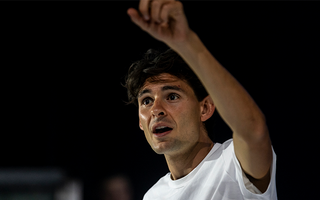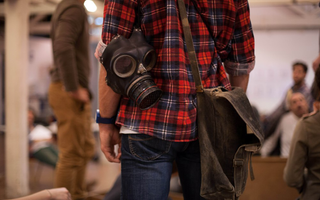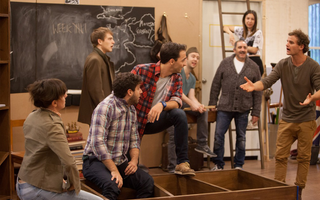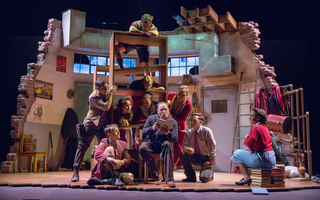Read Director Damien Ryan's program notes from the 2014 production of Henry V.
In little room confining mighty men,
Mangling by starts the full course of their glory
The Chorus sums up this play’s intention. A group of storytellers, ‘flat and unraised spirits’ he calls them, unworthy to stage such a ‘great account’ of military heroism, dare to do so. They have none of the appropriate resources, on ‘an unworthy scaffold’ of a stage - a ‘wooden O’ – where ‘Oh for pity we shall much disgrace… in brawl ridiculous, the name of Agincourt.’ But their chief asset is the only one they really need to stage any story – ‘a muse of fire’ – a capacity to invent and improvise, giving an audience permission to ‘imagine’.
Shakespeare’s imperatives in Henry V are to the improvisatory unity and interdependence of a group of actors and to an audiences’ mental effort, coercing our ‘thoughts’ to overcome the inertia of time and space. With this in mind, I was struck many years ago by a simple series of diary entries from a Vicar who ran a bomb shelter that became a makeshift theatre during the Luftwaffe Blitz of London in 1940–41.
An extract:
26th March 1941. The Boys' Club began tonight with about 40 boys collected from the Tube and other shelters and from the neighbourhood. Think of that in wartime and in an evacuation area! I had the room crowded with people for the Shelter Theatre, and when the boys really got going, the people below got nervous. They thought it was the Blitz preluding the invasion. They have had a rough deal these boys who have missed so much proper school and who have spent so much time in Shelters.
A group of students had formed ‘The Boy’s Club’, staging plays and cabaret song nights to raise the spirits of their fellow refugees while the waves of German bombers tore at the night and their darkened city for an interminable stretch of raids, 57 nights in a row at one stage.
Historian Juliet Gardiner notes that school libraries, low-level classrooms, storerooms and gymnasiums were also frequent refuges in the early days of the raids for students and families who had not left London, many of whom continued their education with brave and passionate teachers. For the major shelters,
Westminster Library donated 2000 books, educational lectures were arranged, there were film shows underground, and ambitiously, Shakespearean plays were put on, along with drinking, fornicating and fighting.
Everything Shakespeare would have wanted in the theatre.
It is easy to imagine Henry V, the rousing story of an English victory against insurmountable odds, rousing the imaginations of those boys. Comparisons between Agincourt, traditionally described as ‘England’s Finest Hour’, and the Battle of Britain now raging above their heads were being made in the streets, on radio and at the highest levels of government, with Churchill himself formally proclaiming that the Battle of Britain victory had now usurped Agincourt as ‘England’s Finest Hour’.
Henry V enjoyed a renaissance during WWII says scholar Mathew Woodcock.
Robert Atkins did Henry V outdoors in Regents Park during the Battle of Britain summer in 1941. Olivier’s unashamedly patriotic film, officially dedicated to the ‘Commandos and Airborne troops of Great Britain’, was released in the months before the D-Day landings in Normandy.
The fact that the French were no longer enemies but much beleaguered allies made no difference to the play’s popularity and indeed brought no criticism of Olivier or other productions. After centuries of war and hatred, the new English and French allegiance still carried a healthy share of satirical mockery of each other’s way of life, language and national character. And it is important to recognise that Shakespeare’s Henry V is no more an historical document than his Henry IV plays. Like Julius Caesar, written in the same year, 1599, they employ a popular historical moment to explore the eternal nature of conflict, leadership and our susceptibility to rhetoric.
A recollection from a young woman in London, also struck me powerfully, of an incident with a young German pilot found walking a suburban street.
One day we came across a crowd looking at a small German aeroplane which had landed. I think this was on Lord Street. People were saying it was a miracle it had not caused more damage or killed anyone. The pilot was only a young boy too, and, of course I imagined my brother…
In this setting, it is a fascinating metaphor for the capture in the play of the enemy prisoner, Le Fer, who is tortured and beaten by Pistol, before becoming one of the thousands of prisoners slaughtered by Henry at Agincourt, crystalising the play’s terrible conflict between humanity and brutality.
We have imagined our young storytellers taking shelter in the autumn of 1940 when surprise air raids were still happening by day as well as night. Oddly enough, St Crispin’s Day, 25 October that year was a remarkable day when, beginning early in the afternoon, many of London’s primary train lines were successfully damaged by direct hits – including the Central Line, Piccadilly, Ealing, South Wimbledon, Trafalgar; and King’s Cross and Leicester Square were suspended due to ‘suspected Delayed Action bombs in the vicinity’.
The play’s rip-roaring sense of adventure is a way for these young people to express their courage, nationalistic fervour and brotherhood, allowing the darkly sickening ambiguities, savageries and ambivalence Shakespeare fuels the play with to creep up on them almost unawares. In their claustrophobic world, young Harry’s long dark night of the soul becomes theirs.
Burgundy, suing for peace in Act 5, makes an extraordinary comparison between a nation’s youth and its natural flora, both of which are ‘promises’, scions of our future:
BURGUNDY
And as our vineyards, fallows, meads and hedges,
Defective in their natures, grow to wildness,
Even so our houses and ourselves and children
Have lost, or do not learn for want of time,
The sciences that should become our country;
But grow like savages,–as soldiers will
That nothing do but meditate on blood,–
To swearing and stern looks, diffused attire
And every thing that seems unnatural.
Schools and their students across South Sudan, Syria, Bagdad, Kabul, the Ukraine and many other conflict zones in 2014 are suffering the same terrors as the children of 1940, and of the French children of 1415, and so on… and on… and on…
Shakespeare has Burgundy ask a question we still can’t answer:
What rub or what impediment is there,
Why that the naked, poor and mangled Peace,
Should not in this best garden of the world,
Put up her lovely visage…
Damien Ryan
Director







